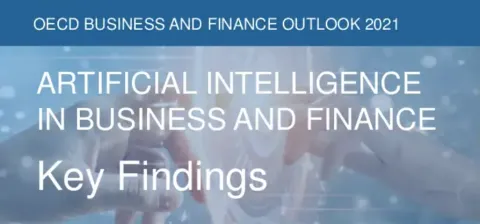
On 24th September 2021, the OECD published the 2021 outlook on Business and Finance, mainly focused on Artificial Intelligence.
The OECD Business and Finance Outlook is an annual publication (this is the seventh edition) containing an analysis of the trends shaping the future of business, finance, and investment. On the matter, artificial intelligence has a central role nowadays.
Indeed, the report highlights that new technologies pose risks and challenges and potential benefits in all sectors, and finance is not excluded.
AI application is always more integrated, and elements of explainability, transparency, accountability and robust data management practices are essential for a trustworthy artificial intelligence.
The report is divided into six chapters: 1) Trends and policy frameworks for AI in finance; 2) AI in finance; 3) Human rights due diligence through responsible AI; 4) Competition and AI; 5) The use of SupTech to enhance market supervision and integrity; 6) Managing access to AI advances to safeguard countries’ essential security interests
The first chapter raises attention to policy issues linked to the use of personal data and security, fairness and explainability considerations. Thus, three complementary frameworks are proposed to support the policy discussion on AI in finance: the OECD AI Principles, the AI system lifecycle, the idea that different types of AI systems raise additional policy considerations.
The second chapter focuses on the use of AI by financial services providers. Among the potential issues discussed in the report are the potential unintended consequences of algorithms, the risk of bias and disparate impact in credit outcomes, and particular attention is given to safeguarding mechanisms. Moreover, this chapter of the report also discusses the use of blockchain and the use of AI to augment the capabilities of smart contracts. The chapter concludes by mentioning the need to 1) sharpen the policy focuses on better data governance by financial firms; 2) promote practices that will help overcome the risk of unintended bias and discrimination, 3) consider disclosure requirements around the use of AI techniques, 4) strengthen model governance and accountability mechanisms, 5) consider the introduction or reinforcement of frameworks for appropriate training and testing of AI models, 6) promote the ongoing monitoring and validation of AI models, 7) place emphasis in human priority in decision making, 8) deploy resources to keep pace with advances in technology and research, 9) promote multidisciplinary dialogue between policymakers and the industry, 10) oversee financial industry use of AI to foster trust in AI.
The third chapter focuses on the potential human rights impacts of AI and the application of OECD guidance on human rights due diligence. The chapter highlights that companies and governments also need to understand and prevent risks of harm to maximize the positive effects of AI. The OECD Guidelines for Multinational Enterprises and OECD Due Diligence Guidance for Responsible Business Conduct provides government-backed frameworks, aligned with international standards on business and human rights that companies can implement to identify better and address risks of harm. This section of the report also examines how existing legislation on human rights and AI deals with this issue.
The fourth chapter centers the attention on potential competition risks resulting from the use of AI. Indeed, the chapter focuses on collusion (explicit and tacit), abuse of dominance and AI developing or implementing anti-competitive strategies, together with personalized pricing and mergers. The key aspects are market studies and advocacy, cooperation between regulators and stakeholders, and reforming enforcement frameworks.
The fifth chapter focuses on the most common uses of SupTech by regulatory, supervisory and enforcement authorities to date. Moreover, it also specifies the challenges and risks, such as data quality, standardization and completeness, legal and procedural challenges, due process rights of companies, data location as a legal challenge, algorithmic models and human oversight and digital security and privacy concerns linked to third-party dependencies, together with procurement rules and barriers to change. To devise adequate SupTech strategies, the report highlights the importance of leadership, budget and skills, to be added to a collaboration between authorities, regulated entities and technology service providers within and across jurisdictions.
The last chapter describes the significant efforts to establish, strengthen and refine investment screening mechanisms through AI, focusing on the traits of the approaches that apply to this particular research on AI. Thus, the report highlights as governments are managing risk for their essential security interests that may result from the transfer of advanced technology to potentially malicious actors or hostile governments. Policy guidance developed at the OECD for investment policies related to national security in 2009 is an essential reference point for policy-making for international investment in established enterprises.

Luca Megale
is a PhD Student at LUMSA University of Rome
and tutor of the European Master in Law and Economics - EMLE (Rome term).
Submitted on Wed, 10/27/2021 - 12:01

